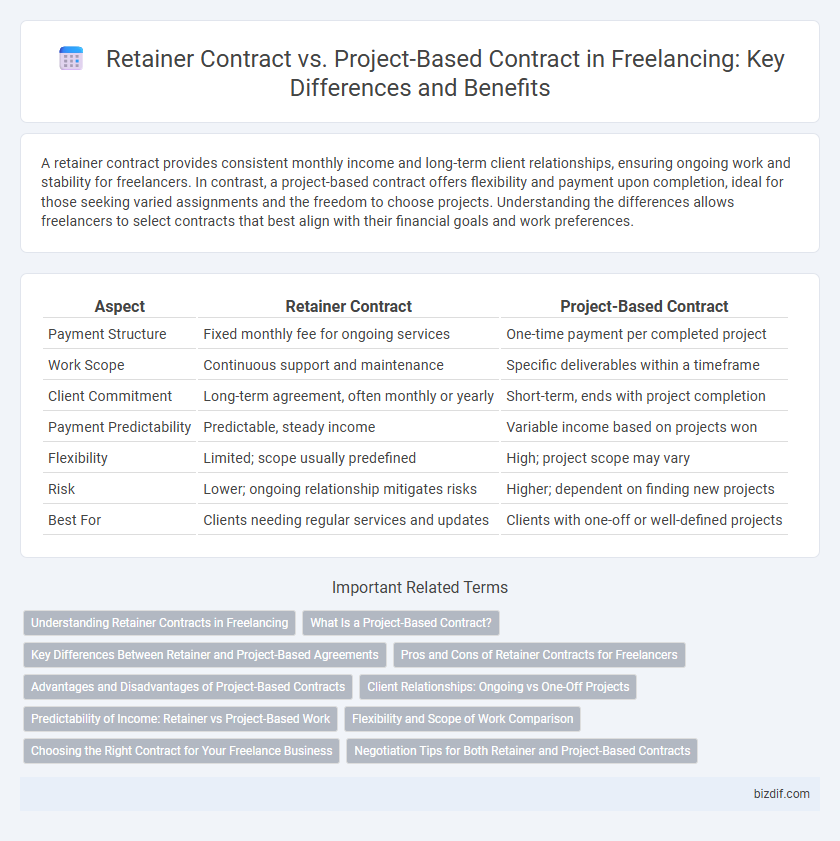A retainer contract provides consistent monthly income and long-term client relationships, ensuring ongoing work and stability for freelancers. In contrast, a project-based contract offers flexibility and payment upon completion, ideal for those seeking varied assignments and the freedom to choose projects. Understanding the differences allows freelancers to select contracts that best align with their financial goals and work preferences.
Table of Comparison
| Aspect | Retainer Contract | Project-Based Contract |
|---|---|---|
| Payment Structure | Fixed monthly fee for ongoing services | One-time payment per completed project |
| Work Scope | Continuous support and maintenance | Specific deliverables within a timeframe |
| Client Commitment | Long-term agreement, often monthly or yearly | Short-term, ends with project completion |
| Payment Predictability | Predictable, steady income | Variable income based on projects won |
| Flexibility | Limited; scope usually predefined | High; project scope may vary |
| Risk | Lower; ongoing relationship mitigates risks | Higher; dependent on finding new projects |
| Best For | Clients needing regular services and updates | Clients with one-off or well-defined projects |
Understanding Retainer Contracts in Freelancing
Retainer contracts in freelancing provide consistent monthly income by securing ongoing services for a fixed fee, ensuring priority availability and long-term client relationships. These agreements often include a set number of hours or deliverables, enhancing budget predictability and workflow stability for both freelancer and client. Understanding retainer contracts helps freelancers balance workload, plan resources efficiently, and build sustained revenue streams compared to project-based contracts.
What Is a Project-Based Contract?
A project-based contract in freelancing defines a fixed scope of work with specific deliverables and deadlines, ensuring clear expectations for both client and freelancer. Payment is usually agreed upon upfront or upon completion of milestones, providing financial clarity and motivation. This contract type is ideal for tasks with well-defined objectives and limited duration, allowing freelancers to focus on particular projects without ongoing commitments.
Key Differences Between Retainer and Project-Based Agreements
Retainer contracts provide ongoing services for a fixed monthly fee, ensuring consistent availability and prioritized support, while project-based contracts are finite, tied to specific deliverables with defined timelines and budgets. Retainers facilitate long-term client relationships and predictable income, whereas project-based agreements emphasize clear scope and completion milestones. Understanding these distinctions helps freelancers manage workload, cash flow, and client expectations effectively.
Pros and Cons of Retainer Contracts for Freelancers
Retainer contracts provide freelancers with steady, predictable income and foster long-term client relationships, enhancing financial stability and workflow consistency. However, they may limit flexibility by requiring a fixed commitment regardless of workload fluctuations, potentially leading to underutilization or overextension. Freelancers must weigh consistent cash flow against potential creative constraints and the challenge of balancing multiple retainers simultaneously.
Advantages and Disadvantages of Project-Based Contracts
Project-based contracts offer clear deliverables and set deadlines, providing freelancers with defined scopes and clients with predictable outcomes. These contracts can lead to higher earnings for specialized tasks but may result in income instability due to the variability of projects. The lack of ongoing engagement can also limit long-term collaboration opportunities and reduce consistent workflow.
Client Relationships: Ongoing vs One-Off Projects
Retainer contracts foster long-term client relationships by ensuring continuous collaboration, predictable income, and dedicated availability for ongoing needs. Project-based contracts typically involve one-off projects with defined scopes, promoting clear deliverables but limited ongoing interaction. Clients benefit from retainer agreements through consistent support, while project-based work suits tasks requiring specialized, short-term solutions.
Predictability of Income: Retainer vs Project-Based Work
Retainer contracts offer consistent, predictable income by providing clients with dedicated ongoing services, ensuring steady cash flow for freelancers. Project-based contracts, while potentially higher paying per engagement, result in variable income dependent on the frequency and size of completed projects. Freelancers seeking financial stability often prefer retainer agreements to mitigate income fluctuations common in project-based work.
Flexibility and Scope of Work Comparison
Retainer contracts offer greater flexibility by providing ongoing work with adjustable priorities, allowing freelancers to manage time and resources across multiple tasks. Project-based contracts define a fixed scope of work with clear deliverables and deadlines, limiting adjustments but ensuring specific outcomes. Freelancers often prefer retainers for long-term, evolving projects, while project-based agreements suit clearly defined, one-time assignments.
Choosing the Right Contract for Your Freelance Business
Selecting the right contract is crucial for stability and growth in freelancing, where retainer contracts provide predictable monthly income through ongoing client commitments, enhancing cash flow and fostering long-term relationships. Project-based contracts offer flexibility and clear deliverables, ideal for freelancers seeking varied work and the opportunity to negotiate scope and deadlines per assignment. Evaluating your workload preferences, financial goals, and client interaction will guide the decision towards retainer or project-based agreements that best align with your freelance business strategy.
Negotiation Tips for Both Retainer and Project-Based Contracts
When negotiating retainer contracts, emphasize clear scope definitions and flexible deliverables to secure consistent income while allowing adjustments. For project-based contracts, prioritize establishing detailed milestones and payment schedules to ensure timely compensation and manageable workloads. In both cases, negotiate terms that include provisions for revisions and cancellations to protect your interests and maintain client satisfaction.
retainer contract vs project-based contract Infographic

 bizdif.com
bizdif.com